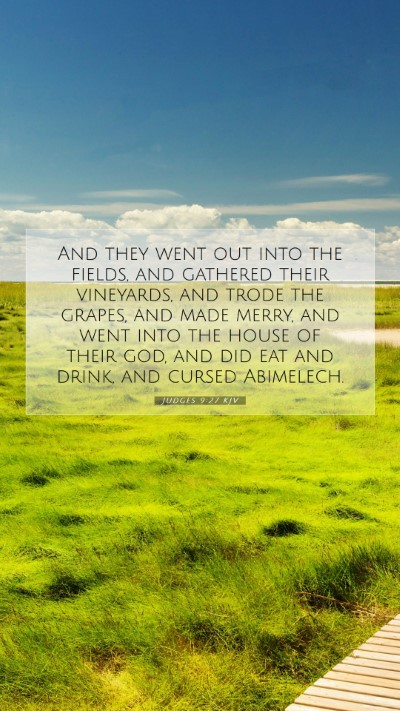Bible Verse Meaning: Judges 9:27
Judges 9:27 states: “And they went out into the fields, and gathered their vineyards, and trode the grapes, and made merry, and went into the house of their god, and did eat and drink, and cursed Abimelech.” This passage encapsulates several themes, including the consequences of leadership, misdirection in worship, and the underlying human tendency to celebrate with revelry amidst moral decline.
Context of Judges 9:27
The context surrounding Judges 9 involves the rise of Abimelech, the illegitimate son of Gideon, who seeks power through treachery and betrayal. After slaughtering his brothers, he becomes king, leading the people of Shechem astray. This verse highlights the celebration of the people who, instead of recognizing their misguided allegiance, indulge in revelry. The passage serves as a critique of community behavior when leadership is corrupt.
Interpretation and Analysis from Commentaries
-
Matthew Henry's Commentary:
Matthew Henry emphasizes the folly of the people who, despite their allegiance to a wicked leader, engage in festivities and worship. He notes that their actions reflect a deeper spiritual blindness and moral apathy. Henry argues that this indulgence demonstrates how society can become desensitized to the consequences of sin.
-
Albert Barnes’ Commentary:
Barnes points out that the mention of gathering grapes and making merry symbolizes both physical harvest and spiritual decay. He discusses how the act of cursing Abimelech in their festivities serves as a paradox, demonstrating their inner conflict and rejection of the tyranny they have embraced. Barnes theorizes that this highlights the duality in human nature where people ignore their moral obligations.
-
Adam Clarke’s Commentary:
Clarke observes that the act of eating and drinking in the house of their god indicates a warped sense of worship. He suggests that they believed they were in communion with their deity even as they engaged in corrupt practices. Clarke’s analysis discusses how this reflects a broader commentary on societal norms where worship can be ritualistic yet devoid of true reverence.
Thematic Significance
This verse brings attention to several critical themes, which are essential for Bible verse understanding:
- The Consequences of Corrupt Leadership: The people of Shechem had allowed themselves to be led by a figure who acted immorally, reflecting how leadership affects societal values.
- False Worship: The act of feasting and cursing in a religious context signifies how easily people can become misled in their worship, prioritizing celebration over spiritual authenticity.
- Celebration Amidst Moral Decline: This verse illustrates the disparity between outward joy and inward spiritual turmoil, prompting readers to consider how societal celebrations can mask underlying issues.
Applications of the Verse
In applying Judges 9:27 to daily life and modern faith practice, a few lessons can be drawn:
- Critical Examination of Leadership: Believers are called to critically evaluate their leaders and the ethical ramifications of their actions, fostering accountability.
- Assessment of Worship Practices: Individuals should engage in introspection regarding their worship practices, ensuring their reverence aligns with their actions and moral standards.
- Awareness of Societal Influence: This verse serves as a reminder to be aware of societal influences that can lead to moral compromise, challenging individuals to prioritize spiritual integrity.
Cross References
This verse can be associated with several other critical passages that enhance its meaning:
- Deuteronomy 17:14-20 - Discusses the nature of kingship and the responsibilities of leaders.
- 1 Samuel 8:7-9 - The people’s demand for a king and God’s warning about the consequences of tyranny.
- Galatians 6:7 - The principle of reaping what one sows applies to both leaders and those who follow them.
Conclusion
In summary, Judges 9:27 serves as a poignant reminder of the dynamics between leadership and communal integrity. Through the perspectives provided by various commentaries, we gather deeper Bible study insights into the human condition, encouraging readers to seek true worship and to be wary of the influences that can lead to moral laxity. This passage is beneficial for those engaged in Bible study groups, online Bible study, and others seeking Bible study resources for better understanding of Scripture.


